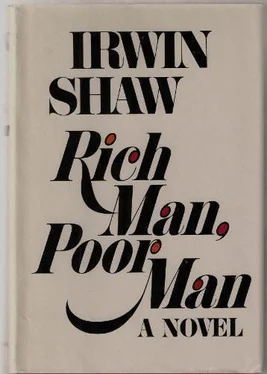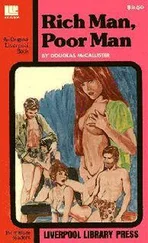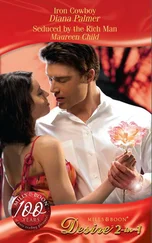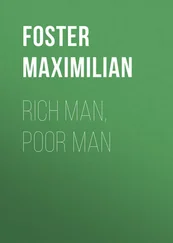She had met him in the restaurant on the Buffalo lake front where she worked as a waitress. The orphanage had placed her there. The restaurant was run by an ageing German-American couple named Mueller and the people at the orphanage had chosen them as employers because they were kindly and went to Mass and allowed Mary to stay with them in a spare room above their apartment. The Muellers were good to her and protected her and none of the customers dared to speak improperly to her in the restaurant. The Muellers let her off three times a week to continue her education at night school. She was not going to be a waitress in a restaurant all her life.
Axel Jordache was a huge, silent young man with a limp, who had emigrated from Germany in the early 1920s and who worked as a deckhand on the Lake steamers. In the winter, when the Lakes were frozen over, he sometimes helped Mr Mueller in the kitchen as a cook and baker. He hardly spoke English then and he frequented the Mueller’s restaurant so that he could have someone to talk to in his native tongue. When he had been wounded in the German army and couldn’t fight
any more they had made him into a cook at the hospital in Frankfurt.
Because, during another war, a young man had come out of a hospital alienated and looking for exile, she was standing tonight in a shabby room, over a shop in a slum, where every day, twelve hours a day, she had given up her youth, her beauty, her hopes. And no end in sight.
He had been most polite. He never as much as tried to hold her hand and when he was in Buffalo between voyages he would walk her to night school and wait to accompany her home. He had asked her to correct his English. Her English was a source of pride to her. People told her they thought she came from Boston when they heard her talk and she took it as a great compliment. Sister Catherine whom she admired above all the teachers in the orphanage, came from Boston, and spoke crisply and with great precision and had the vocabulary of an educated woman. ‘To speak slovenly English,’ Sister Catherine had said, ‘is to live the life of a cripple. There are no aspirations denied a girl who speaks like a lady.’ She, had modeled herself on Sister Catherine and Sister Catherine had given her a book, a history of Irish heroes, when she had left the orphanage. ‘To Mary Pease, my most hopeful student,’ was written in a bold, upright hand on the flyleaf. Mary had modelled her handwriting on Sister Catherine’s too. Somehow, Sister Catherine’s teaching had made her believe that her father, whoever he was, must have been a gentleman.
With Mary Pease coaching him in the silvery Back Bay accents of Sister Catherine, Axel Jordache had learned to speak proper English very quickly. Even before they were married, he spoke so well that people were surprised when he told them that he had been born in Germany. There was no denying it, he was an intelligent man. But he used his intelligence to torment her, torment himself, torment everyone around him.
He hadn’t even kissed her before he proposed to her. She was nineteen at the time, her daughter Gretchen’s age, and a virgin.
He was unfailingly attentive, always cleanly bathed and shaved and he always brought her small gifts of candy and flowers
when he returned from his trips.
He had known her for two years before he proposed.. He hadn’t dared to speak earlier, he said, because he was afraid she would reject him because he was a foreigner and because he limped. How he must have laughed to himself as he saw the tears come to her eyes at his modesty and his lack of confidence in hiimself. He was a diabolical man. weaving lifetime plots.
She said yes, conditionally. Perhaps she thought she loved him. He was a good-looking man, with that Indian head of black hair and a sober, industrious, thin face and clear, brown eyes that seemed soft and considerate when they looked at her. When he touched her it was with the utmost deceptive gentleness, as though she were made of china. When she told him she had been born out of wedlock (her phrase) he said he already knew it, from the Muellers, and that it didn’t make any difference, in fact, it was a good thing, there wouldn’t be any in-laws to disapprove of him. He himself was cut off from what remained of his family. His father had been killed on the Russian front in 1915 and his mother had remarried a year later and moved to Berlin from Cologne. There was a younger brother he had never liked, who had married a rich German-American girl who had come to Berlin after the war to visit relatives. The brother now lived in Ohio, but Axel never saw him. His loneliness was apparent and it matched her own.
Her conditions were stringent. He was to give up his job on the Lakes. She didn’t want a husband who was away most of the time and who had a job that was no better than a common labourer’s. And they were not to live in Buffalo, where everyone knew about her birth and the orphanage and where at every turn she would meet people who had seen her working as a waitress. And they were to be married in church.
He had agreed to everything. Oh, diabolical, diabolical. He had some money saved up and through Mr Mueller he got in ouch with a man who had a bakery in Port Philip whose lease was for sale. She made him buy a straw hat for the trip to Port Philip to conclude the deal. He was not to go wearing his usual doth cap, that hangover from Europe. He was to look like a respectable American businessman.
Two weeks before the wedding, he took her to see the shop in which she was going to spend her life and the apartment above it in which she was going to conceive three children. It was a sunny day in May and the shop was freshly painted^ with a large, green awning to protect the plate-glass window, with its array of cakes and cookies, from the sun. The street was a dean, bright one, with other little shops, a hardware store, a dry-goods store, a pharmacy on the corner. There was even a milliner’s shop, with hats wreathed in artificial flowers on cands in the window. It was the shopping street for a quiet lential section that lay between it and the river. Large, unfortable houses behind green lawns. There were sails on a river and a white excursion boat, up from New York, passed as they sat on a bench under a tree looking across the broad stretch of summer-blue water. They could hear the band on board playing waltzes. Of course, with his limp, they never danced.
Oh, the plans she had that sunny May waltzing rivery day; Once they were established, she would put in tables, redecorate the shop, put up curtains, set out candles, serve chocolate and tea, then, later, buy the shop next door (it was empty that first day she saw it) and start a little restaurant, not one like the Muellers’, for working men, but for travelling salesmen and the better class of people of the town. She saw heir husband in a dark suit and bow tie showing diners to their table, saw waitresses in crisp muslin aprons hurrying with loaded platters out of the kitchen, saw herself seated behind the cash register, smiling as she rang up the checks, saying, ‘I hope you enjoyed your dinner,’ sitting down with friends over coffee and cake when the day’s work was over.
How was she to know that the neighbourhood was going to deteriorate, that the people she would have liked to befriend would consider her beneath them, that the people who would have liked to befriend her she would consider beneath her, that the building next door was to be torn down and a large, clanging garage put up beside the bakery, that the millinery shop was to vanish, that the houses facing the river would be turned into squalid apartments or demolished to make place for junkyards and metal-working shops?
There were never any little tables for chocolate and cakes, never any candles and curtains, never any waitresses, just herself, standing on her feet twelve hours a day summer and winter, selling coarse loaves of bread to grease-stained mechanics and slatternly housewives and filthy children whose parents fought drunkenly with each other in the street on Saturday nights.
Читать дальше











